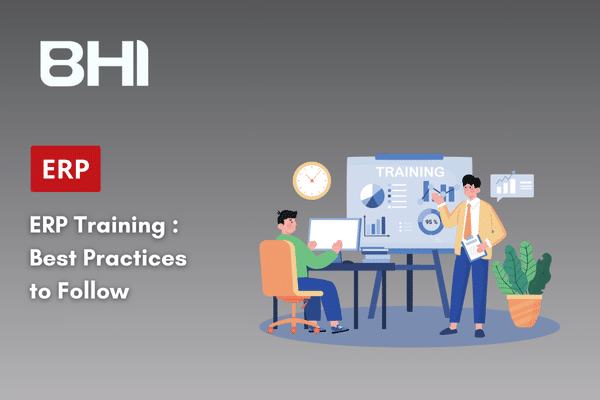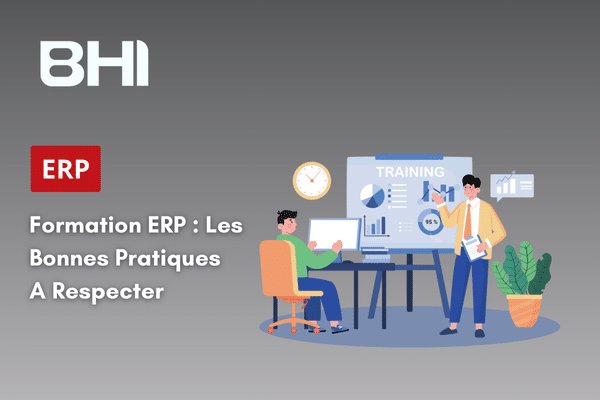The success of an ERP project largely depends on end-user adoption, far beyond the technical performance of the system alone. Industry analysis shows that the main causes of ERP failure often lie in insufficient human support, particularly change management and inadequate training, which generate frustration and resistance.
The Critical Challenge of ERP Training
An Underestimated Strategic Investment
Training is not merely technical transmission: it constitutes a transformation of organizational practices and culture. However, budget allocation regularly falls short of expert recommendations. According to Opkey, training and change management are underfunded in 55-75% of ERP projects, increasing the risk of failure and budget overruns. Organizations that invest in comprehensive training and support programs significantly outperform others – the optimal share of project budget dedicated to training and support generally exceeds 15% according to published benchmarks.
Impact on Organizational Performance
Numerous industry studies confirm the positive effect of structured training programs on productivity and ERP tool adoption. Differentiated training, adapted to each user’s role, accelerates the achievement of target indicators and promotes functional appropriation. It also reduces the risk of change resistance, particularly during the deployment phase.
Proven Training Methodologies
Role-Based and Responsibility-Focused Approach
Personalized training paths by profession generate user satisfaction rates significantly higher than those of generic modules. Iterative learning, with short and progressive sessions, improves knowledge retention and reduces technical support demand after go-live. The integration of hybrid methods (face-to-face + digital) and interactive modules (e-learning, ERP simulators) optimizes attendance rates and lowers training costs without sacrificing educational quality.
Progressive and Iterative Training
Step-by-step learning proves more effective than concentrated intensive sessions. The progressive training model, spread over 8 to 12 weeks with sessions of maximum 2 hours, enables optimal assimilation of concepts and processes.
This approach respects individual learning curves and maintains participant engagement. Companies adopting this model observe a 35% reduction in post-training support requests and a 28% improvement in user performance indicators at 6 months.
Modern Training Tools and Technologies
Digital and Interactive Learning
The digitalization of ERP training opens new perspectives for educational efficiency. Dedicated e-learning platforms, environment simulators, and augmented reality modules transform the traditional learning experience.
Hybrid training, combining face-to-face and digital approaches, shows superior results with an 89% completion rate versus 67% for exclusively face-to-face training. This approach also reduces training costs by 30 to 45% while maintaining educational quality.
Gamification for Enhanced Engagement
Integrating game elements into training paths generates remarkable results in terms of engagement and retention. Programs incorporating game mechanics (challenges, rankings, rewards) record a 67% improvement in voluntary participation rates for supplementary training.
This approach proves particularly effective for generations accustomed to digital interfaces, now representing 45% of enterprise users according to 2024 demographic statistics.
Measuring Training Effectiveness
Key Performance Indicators
High-performing companies systematically measure functional adoption rates and process execution velocity to adjust their post-deployment support. The return on investment for ERP training is multifaceted: productivity gains, error reduction, decreased turnover related to usage frustration.
Training Return on Investment
ROI calculation for training integrates several economic dimensions. Beyond direct costs (trainers, materials, time invested), productivity gains, error reduction, service quality improvement, and decreased support needs must be considered.
Industry studies demonstrate that one euro invested in ERP training generates an average of 4.2 euros in value over 24 months, with peaks reaching 7 euros for the most comprehensive programs in high-value-added sectors.
Contemporary Challenges and Solutions
Change Resistance
Change resistance remains a major obstacle but can be mitigated (up to 55% according to field feedback) through change management mechanisms integrated into training, ranging from internal communication to project ambassador mobilization. Finally, continuous training becomes essential to follow technological and regulatory evolution of internal solutions, sustainably supporting operational performance and new feature adoption.
Adaptation to Technological Evolution
The rapid evolution of management solutions requires a continuous rather than one-time training approach. Functional updates, new regulations, and evolving business needs require permanent educational support.
Companies that have implemented continuous training programs observe better exploitation of new features, with a 73% adoption rate versus 34% for those practicing only initial training.
Towards ERP Training Excellence
Investment in user training directly conditions the success of your digital transformation. Beyond technical aspects, human support determines the appropriation and valorization of your new management tool.
Best practices converge toward a global approach integrating personalization, progressiveness, and continuity. This training strategy transforms ERP implementation from a technical project into a genuine organizational performance lever.
Ready to Optimize Your Team Training ?
Have you already experienced an ERP deployment in your company ? What were your main challenges regarding user training ? How did you manage change resistance ?
For in-depth expertise and personalized support in your training strategy, discover how we can secure your solution adoption and help transform your users into true digital transformation ambassadors. Our expert team guides you through every step from training needs analysis to post-deployment follow-up, including personalized path design and session facilitation. Contact us to transform this educational challenge into an operational excellence opportunity for your organization.

















